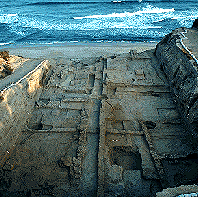Over the weekend, news hit major media outlets regarding the excavation of a Philistine cemetery just outside the ancient city of Ashkelon. You can find here the National Geographic, NY Times, Biblical Archaeological Review, and Haaretz releases. Ashkelon was one of the 5 major Philistine cities that populated the Coastal Plain during Biblical times, and excavations there have gone on now for over 30 years, thanks to the Leon Levy Expedition. It is one of the most important sites for understanding Philistine culture.
It goes without saying that the immediate importance of this find is that Philistine burial practices can now be examined in detail without the shadow of classification. Indeed, there have been other sites linked to Philistine burials, but they have also been disputed and questioned. Here, it's undeniable. We are dealing with a Philistine site that exhibits over 200 skeletons, of all ages. Consequently, the excavators can work with a little more certainty, analyzing these burial customs against known baselines to understand relationships and developments. So, for example, what does the material culture interned with the bodies tell us about their value and thought systems? What does it mean that the burial practices of the Philistines were significantly difference than their Canaanite neighbors?
However, in my opinion, the most interesting possibilities will come in the form of DNA analysis. Ever since the human genome was mapped in 2003, genetic analysis in the scientific community has exploded. Indeed, DNA sequencing has been around for sometime, but the ability to map out where human genes sit on our chromosomes has opened up a world of opportunity. Biblical archaeology needs to properly harness these genetic tools, for I think a new world awaits.
 Most immediately, we may be able to put to bed the long debate of Philistine origins.Consider this, if the skeletons contain enough usable DNA (and from the suggestions of the articles, this may be the case), then they will likely be able to sequence the DNA. Whether it's the entire thing or just chunks of it, scientists may be able to use that sequence against known base lines to determine the relationships and developments of the Philistines. In a word, we may be able to identify whence they came. Burial customs are neat, and they are very important to understanding the thought-world of any culture. But sign me up for harnessing the implications of genetic analysis.
Most immediately, we may be able to put to bed the long debate of Philistine origins.Consider this, if the skeletons contain enough usable DNA (and from the suggestions of the articles, this may be the case), then they will likely be able to sequence the DNA. Whether it's the entire thing or just chunks of it, scientists may be able to use that sequence against known base lines to determine the relationships and developments of the Philistines. In a word, we may be able to identify whence they came. Burial customs are neat, and they are very important to understanding the thought-world of any culture. But sign me up for harnessing the implications of genetic analysis.
All of this is another example of how science is manifesting itself in new ways in the field of Biblical Archaeology, and, by implication, Biblical Studies. It will be very interesting to see how this all plays out over the next few months. Certainly, this will give the field plenty to talk about in San Antonio this coming November. I look forward to how our understanding of the Philistines will be rounded out through this site. This will in turn allow us to understand better the acidic relationship between the Israelites and the Philistines that informed so much of the Old Testament and ancient Israelite identity.
It goes without saying that the immediate importance of this find is that Philistine burial practices can now be examined in detail without the shadow of classification. Indeed, there have been other sites linked to Philistine burials, but they have also been disputed and questioned. Here, it's undeniable. We are dealing with a Philistine site that exhibits over 200 skeletons, of all ages. Consequently, the excavators can work with a little more certainty, analyzing these burial customs against known baselines to understand relationships and developments. So, for example, what does the material culture interned with the bodies tell us about their value and thought systems? What does it mean that the burial practices of the Philistines were significantly difference than their Canaanite neighbors?
However, in my opinion, the most interesting possibilities will come in the form of DNA analysis. Ever since the human genome was mapped in 2003, genetic analysis in the scientific community has exploded. Indeed, DNA sequencing has been around for sometime, but the ability to map out where human genes sit on our chromosomes has opened up a world of opportunity. Biblical archaeology needs to properly harness these genetic tools, for I think a new world awaits.
All of this is another example of how science is manifesting itself in new ways in the field of Biblical Archaeology, and, by implication, Biblical Studies. It will be very interesting to see how this all plays out over the next few months. Certainly, this will give the field plenty to talk about in San Antonio this coming November. I look forward to how our understanding of the Philistines will be rounded out through this site. This will in turn allow us to understand better the acidic relationship between the Israelites and the Philistines that informed so much of the Old Testament and ancient Israelite identity.



